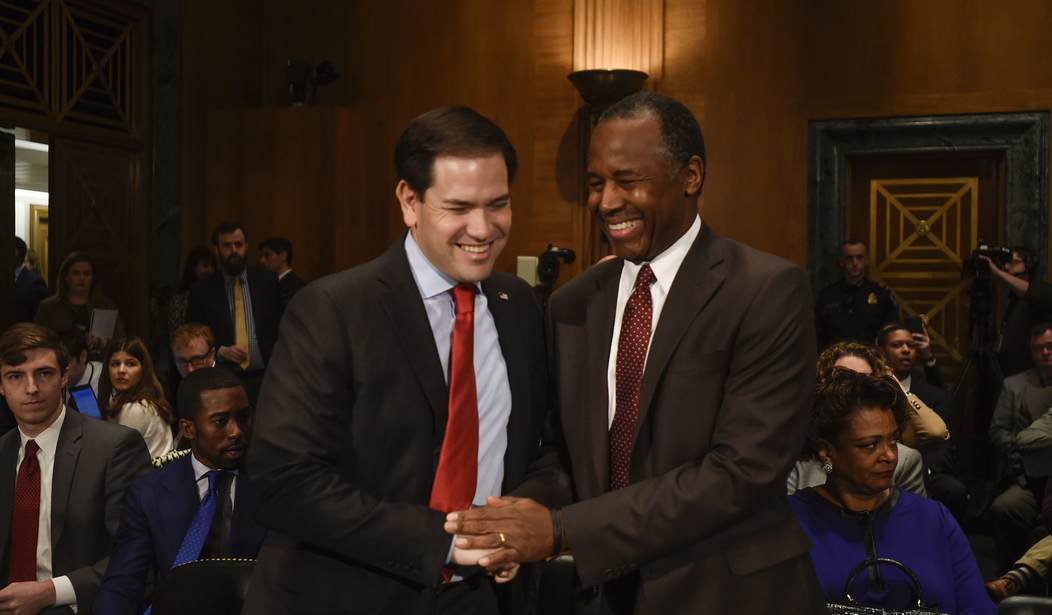Dr. Ben Carson told Democrats during his nomination hearing before the Senate Committee on Banking, Housing and Urban Affairs today by saying allegations that he neither understood nor believed in the Department of Housing and Urban Development’s mission were the result of his past statements being misconstrued, misinterpreted or taken out of context.
“Government is extraordinarily important,” Carson said. “We have an opportunity to do something about moving people off government assistance and out of poverty if we take a more holistic approach.”
He said of HUD, “It can be so much more than putting roofs over poor people’s heads.”
When it became apparent that wasn’t good enough for a couple of the Democrats on the committee, Carson assured skeptics who wondered if he really supported everything HUD stands for, like the Fair Housing Assistance Program and LGBTQ rights, by saying, “Of course, I will enforce the law of the land.”
Responding to questioning from the Ohio Democratic Sen. Sherrod Brown, Carson also said he had no problem with affirmative action or integration.
“But I do have a problem with people on high dictating it when they don’t know what is going on in the local area,” Carson said.
Sen. Elizabeth Warren (D-Mass.) asked Carson to guarantee no one in President-elect Trump’s family would ever make a dime off a HUD project.
He declined.
“I am not going to scrap a good project just because someone you’re targeting is going to make $10 off of it,” Carson said. “I will manage things in a way that will benefit the American people.”
Warren eventually admitted her line of questioning was intended to bring attention to the Presidential Conflicts of Interest Act that she has introduced to compel Trump to put his holdings into a blind trust.
Not long before the end of the hearing, under questioning from Brown, Carson again refused to promise no one associated with Trump would be profitably involved in a HUD project.
Eventually, though, Carson reluctantly assured Brown that he would draft a plan to keep the committee aware of any projects that might involve the Trump family.
That was the only real dust-up. The two-hour-plus hearing was much less confrontational than it might have been.
Carson’s nomination by Trump had been greeted with skepticism and even derision from day one by people like Warren and Brown, and organizations such as the ACLU that said that he not only didn’t believe in the mission of HUD, but Carson obviously didn’t understand it, either.
Democrats like Warren, who sent Carson a letter with 35 questions covering everything from lead paint poisoning to housing discrimination, seemed ready to pounce on the famed neurosurgeon, arguing running HUD wasn’t brain surgery.
Carson, though, said in his opening statement that he understood only too well what “housing insecurity” is like after being raised in the inner city of Detroit by a single mother who had left school after the third grade, and left her husband after finding out he was a bigamist.
Carson said his mother ingrained in him a desire to never be dependent on anyone else.
He explained to the committee that she led by example, refusing to accept an Aid to Dependent Children check from the government. Carson also said his mother took him to one of the houses she was paid to clean and told him, “The person who has the most to do with where you live is you, not the environment.”
Just as his mother would have, Carson also stressed that government neither has all the answers nor all the money it would take to eliminate poverty in America.
So, Carson said he would push for the creation of HUD partnerships with private businesses.
“There is a lot of money in the private sector,” he said. “We just have to help the private sector realize the benefits.”
Carson assured the committee he would never try to make the poor live without a social welfare safety net.
“It would be cruel and unusual punishment to remove entitlement programs without providing an alternative,” he said.
Throughout the hearing, Carson stressed that his overarching goal would be to make HUD much more than it is today.
He promised to work with other government departments, like Labor, Education, Transportation and Justice, to “remove people from government dependency” and get them into productive employment.
“I feel very strongly we should do everything we can because we recognize that every one of our people that we do not develop is someone who is not contributing to the nation moving forward,” Carson said. “The bigger picture is fixing our economy.”









Join the conversation as a VIP Member